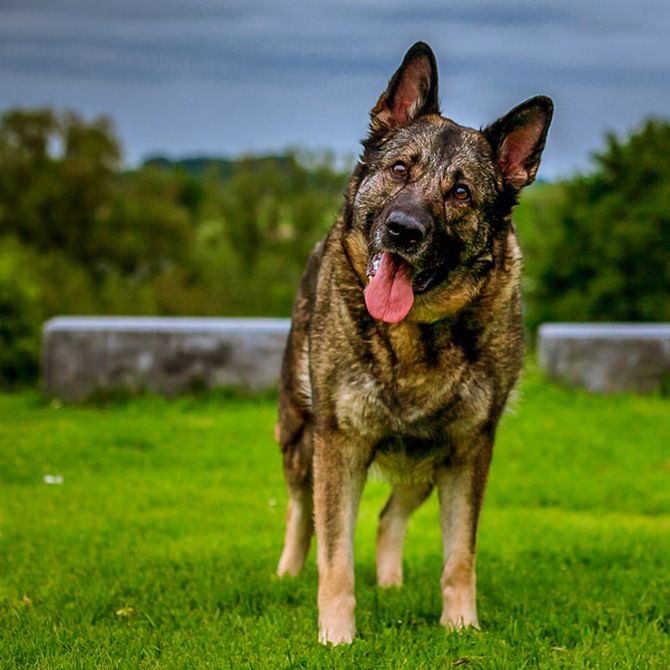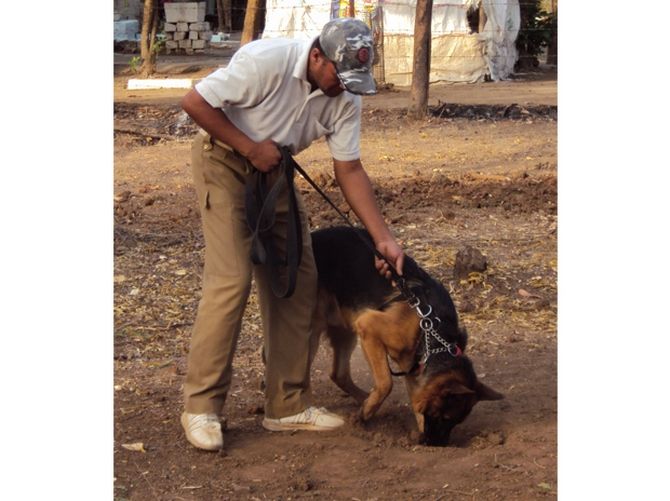Dog squads are sniffing out poachers and busting their plans. Geetanjali Krishna tells us more about these canine crusaders!

India's forests and wildlife department has been fighting a difficult battle against poaching and illegal trade in animal products.
In the last couple of years, however, it has had help from unexpected quarters.
TRAFFIC, the international wildlife trade monitoring network, has trained several batches of dogs to sniff out contraband at check-posts as well as entry points in forests.
"Dogs have an incredible sense of smell," says Shekhar Kumar Niraj, head of TRAFFIC in India.
"They have been increasingly seen as partners in the global effort to intercept illegal wildlife and wildlife products like ivory, rhino horns, sea turtles and pangolins smuggled through airports, shipping ports and public transportation centres."
Taught intensively for nine months to detect tiger and leopard parts and bear bile, the Indian canine squad has had some notable successes, not just in investigations but also in enforcement.
Jimmy, a dog from Madhya Pradesh, has sniffed out skins and bones of tigers and leopards, poached sambar meat and many endangered animals and birds.
So much so that he was awarded a Certificate of Merit by the governor of Madhya Pradesh in 2013 for busting at least 25 wildlife poaching and smuggling cases.
In 2010, villagers in a remote part of Maharashtra killed a leopard and hid its body parts to sell later.
Their plot was foiled by Raja, a sniffer dog posted at Bhrampuri Wildlife Division, Maharashtra, leading to the arrest of seven.
It has been observed that the canines trained by TRAFFIC have not only successfully unearthed poached tiger and elephant parts, but also helped curb the growing trade in lesser known species such as pangolins (killed for their meat, a delicacy in Southeast Asia, and scales, used in traditional Chinese medicine), monitor lizards (their meat supposedly has aphrodisiacal properties, and their skin is used to make high-end bags and belts) and star tortoises (prized as exotic pets).
In 2010, Jackie, a canine stationed in Madhya Pradesh, helped apprehend two poachers with illegal animal traps and six live grey francolins.
Over 80 successful wildlife seizures have been undertaken by TRAFFIC's sniffer dogs since the programme began in 2008.
Their presence, it has been observed, also deters hunting in areas around Rajaji National Park (Uttarakhand), Valmiki Tiger Reserve (Bihar) and the Satpura Maikal landscape (Madhya Pradesh).
The sniffer squad has also proved to be of great help in wildlife crime investigation.
Tracey, a two-year-old German Shepherd dog, was called to help when forest officials in Dalma Wildlife Sanctuary in Jharkhand found a dead elephant with missing tusks.
With her two handlers, Rajbeer and Rampado Dash, Tracy led the team to the spot where the tusks were hidden.

"She did what the police could not have accomplished, showing how sniffer dogs can make such investigations faster and more accurate," says Niraj.
Using sniffer dogs to aid investigations has another advantage. Courts recognise not only their expertise, but also the fact that these canines are unbiased and objective.
"Evidence gathered by human agencies can be flawed or tampered with, but sniffer dogs unearth only the truth," says he.
Turning these intrepid German Shepherd dogs into effective weapons in the arsenal of wildlife conservators requires one-on-one training with their handlers.
The 23rd Battalion of Special Armed Forces, Madhya Pradesh, Police Dog Training Centre, Bhopal, and the National Dog-training Centre at ITBP camp in Panchkula, Haryana, have been the main partners in training these dogs.
"We now have seven states, including Madhya Pradesh, Maharashtra and Uttarakhand, as our partners.
"They depute their forest department employees to undergo training as handlers with us.
"Once the training is completed, the handlers as well as their dog are posted to different forest zones," Niraj explains.
The training isn't cheap: TRAFFIC, a joint programme of World Wildlife Fund and International Union for Conservation of Nature, forks out up to Rs 3 lakh for the training of a single dog, while the partner state government takes care of the salaries of the two handlers.
So far, 12 dogs and 24 handlers have been successfully trained under this programme.
The number is low because the training period is long and intensive and also because states have been slow to recognise the merits of employing sniffer dogs.
"Initially, the programme was met with a little scepticism.
"Now more states have realised how effective our dogs can be and we have consequently begun to scale up our operations," says Niraj.
TRAFFIC has spent the last few years sharing details of this programme with the state wildlife departments that are still not on board.
"This year, we are training 14 dogs and 28 handlers from seven states and hope to increase this number in the coming years," says Niraj.
"My dream is to see every state in India, which has forests, to have four to five canines to boost its protection and conservation efforts."
Lead image used for representational purposes only.
Photograph: Harold Meerveld/Creative Commons












 © 2025
© 2025